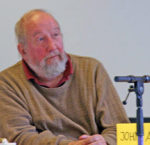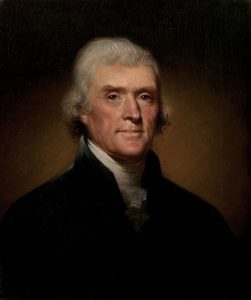We Need Their Voices Today! (4) Thomas Jefferson
TRANSCEND MEMBERS, 17 Jul 2017
John Scales Avery, Ph.D. – TRANSCEND Media Service
Introduction
This is a collection of biographical sketches showing people whose wise voices from the past can help to guide us today. All of the women and men, brief glimpses of whose lives and ideas are portrayed here, gave a high place to compassion. None of them was a slave to greed. We need their voices today!
[Note from TMS editor: It will be posted one biographical sketch per week]
**********************************************
Jefferson’s Education
Thomas Jefferson (1743-1826) was born in the British Colony of Virginia. His father, Peter Jefferson, who was a planter and surveyor, died when Thomas Jefferson was 14 years old, and Thomas inherited an estate of approximately 5000 acres.
At the age of 16, Jefferson entered the College of William and Mary in Williamsburg Virginia. His studies there included mathematics and philosophy. He became familiar with John Locke, Francis Bacon and Isaac Newton. Jefferson also improved his knowledge of languages and his skill in playing the violin. He graduated in two years and afterwards studied law. Jefferson was an avid reader, hand his personal library ultimately included 6,500 books.
When the British government passed the Intolerable Acts in 1774, Jefferson wrote a resolution calling for a day of fasting and prayer in protest, as well as a boycott of all British goods. He later expanded this into a larger publication with the title “A Summary View of the Rights of British America”.
Monticello
In 1768, Jefferson began construction his home, Monticello, on a hilltop overlooking his estate. It was a large mansion in the Paladian style, designed by Jefferson. He worked to improve it throughout most of his life. It is now a much-visited museum and national monument.
In 1772, Jefferson married his third cousin, the 23-year old widow Martha Wayles Skelton. The marriage was an extremely happy one, and they had six children. However, weakened by the birth of her last child, Martha died at the age of 33. Before her death she made her heartbroken husband promise never to marry again because she could not bear to think of her children being brought up by a stepmother. Through Martha, Jefferson inherited an additional estate of 11,000 acres, but he also inherited the debts of the estate. These debts were a financial worry for Jefferson until he finally was able to pay all of them..
Political service to Virginia and to the United States
At 33, Jefferson represented Virginia at the Continental Congress, where he was one of the youngest delegates. He was the main author of the {\em Declaration of Independence}. In writing it, he drew on his deep knowledge of Enlightenment thought, for example the writings of John Locke and Montaigne.
As a Virginia legislator, Jefferson drafted a law for religious freedom. He also served as Virginia’s wartime governor (1779-1781).
In 1785, Jefferson became the United States’ Minister to France. Later, from 1790 to 1793 he served as Secretary of State under President George Washington. He was America’s second Vice President, under John Adams. Finally, from 1801 to 1809 he served as the third President of the United States.
A few things that Thomas Jefferson said
“I tremble for my country when I reflect that God is just; that his justice cannot sleep forever.”
“Educate and inform the whole mass of the people… They are the only sure reliance for the preservation of our liberty.”
“Do you want to know who you are? Don’t ask. Act! Action will delineate and define you.”
“I know of no safe depository of the ultimate powers of the society but the people themselves; and if we think them not enlightened enough to exercise their control with a wholesome discretion, the remedy is not to take it from them but to inform their discretion.”
“The care of human life and happiness, and not their destruction, is the first and only object of good government.”
“I never considered a difference of opinion in politics, in religion, in philosophy, as cause for withdrawing from a friend.”
“All, too, will bear in mind this sacred principle, that though the will of the majority is in all cases to prevail, that will to be rightful must be reasonable; that the minority possess their equal rights, which equal law must protect, and to violate would be oppression.”
“Our country is now taking so steady a course as to show by what road it will pass to destruction, to wit: by consolidation of power first, and then corruption, its necessary consequence.”
“Sometimes it is said that man cannot be trusted with the government of himself. Can he, then be trusted with the government of others? Or have we found angels in the form of kings to govern him? Let history answer this question.”
“The world is indebted for all triumphs which have been gained by reason and humanity over error and oppression.”
“Conquest is not in our principles. It is inconsistent with our government.”
“The spirit of this country is totally adverse to a large military force. I have seen enough of one war never to wish to see another.”
“I have sworn upon the altar of God, eternal hostility against every form of tyranny over the mind of man.”
“If there is one principle more deeply rooted in the mind of every American, it is that we should have nothing to do with conquest.”
“We hold these truths to be self-evident, that all men are created equal, that they are endowed by their Creator with certain unalienable Rights, that among these are Life, Liberty and the pursuit of Happiness. That to secure these rights, Governments are instituted among Men, deriving their just powers from the consent of the governed…”
Thomas Jefferson, architect of American democracy, we need your voice today!
Contents:
1 Saint Francis of Assisi
2 William Blake
3 Thomas Paine
4 Thomas Jefferson
5 Mary Wollstonecraft
6 William Godwin
7 The Marquis de Condorcet
8 Thomas Robert Malthus
9 Percy Bysshe Shelley
10 Robert Owen
11 John Stuart Mill
12 Henry David Thoreau
13 Count Leo Tolstoy
14 Mahatma Gandhi
15 Martin Luther King
16 Wilfred Owen
17 Albert Einstein
18 Edna St. Vincent Millay
19 Bertha von Suttner
20 George Orwell
21 Helen Keller
22 We need their voices, and yours!
________________________________________________
 John Scales Avery, Ph.D., who was part of a group that shared the 1995 Nobel Peace Prize for their work in organizing the Pugwash Conferences on Science and World Affairs, is a member of the TRANSCEND Network and Associate Professor Emeritus at the H.C. Ørsted Institute, University of Copenhagen, Denmark. He is chairman of both the Danish National Pugwash Group and the Danish Peace Academy and received his training in theoretical physics and theoretical chemistry at M.I.T., the University of Chicago and the University of London. He is the author of numerous books and articles both on scientific topics and on broader social questions. His most recent books are Information Theory and Evolution and Civilization’s Crisis in the 21st Century (pdf).
John Scales Avery, Ph.D., who was part of a group that shared the 1995 Nobel Peace Prize for their work in organizing the Pugwash Conferences on Science and World Affairs, is a member of the TRANSCEND Network and Associate Professor Emeritus at the H.C. Ørsted Institute, University of Copenhagen, Denmark. He is chairman of both the Danish National Pugwash Group and the Danish Peace Academy and received his training in theoretical physics and theoretical chemistry at M.I.T., the University of Chicago and the University of London. He is the author of numerous books and articles both on scientific topics and on broader social questions. His most recent books are Information Theory and Evolution and Civilization’s Crisis in the 21st Century (pdf).
This article originally appeared on Transcend Media Service (TMS) on 17 Jul 2017.
Anticopyright: Editorials and articles originated on TMS may be freely reprinted, disseminated, translated and used as background material, provided an acknowledgement and link to the source, TMS: We Need Their Voices Today! (4) Thomas Jefferson, is included. Thank you.
If you enjoyed this article, please donate to TMS to join the growing list of TMS Supporters.

This work is licensed under a CC BY-NC 4.0 License.

